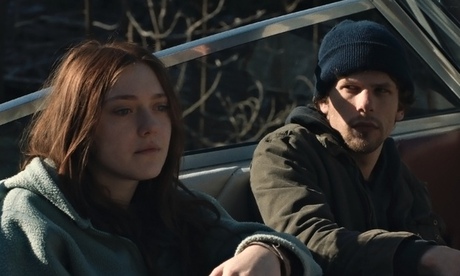
The title of Kelly Reichardt's Night Moves has a ghostly echo of Arthur Penn's 1975 noir of the same name, which featured Gene Hackman as the private detective hunting a missing woman, and getting into a watery nightmare. There are traces of noir here, too, but distinctively mixed with something calmer, blanker, less obviously flavoured with genre. This Night Moves is like a suspense movie held in suspense: a thriller that behaves as if it is a gentle, indie-arthouse film concerned only with evoking the static beauty of nature. There can't be many screen dramas in which a climactic fight between characters is accompanied with quiet, plangent pan-pipe music on the soundtrack, the sort that one generally hears in the reception at a hotel spa. And yet the film is gripping and disturbing.
Jesse Eisenberg, Dakota Fanning and Peter Sarsgaard play a trio of environmental activists: Josh, Dena and Harmon, respectively. Josh lives and works at a co-operative farm; Dena is his close friend – there may be a romantic entanglement between them – and Harmon is a slightly freaky ex-Marine of Josh's acquaintance, with long hair, radical views and some rather picturesque vocab: he says "split" instead of "leave". His character is another way in which this feels interestingly like a revival of American indie cinema of the 70s.
Enraged by the futile rhetoric of conventional environmental activism, they plan direct action: to blow up a hydro-electric dam, which is destroying wildlife. As Josh puts it, the dam is there "killing all the salmon, so you can run your iPod every second of your life". Rich-kid Dena's family is bankrolling the operation; she pays for the 1,500lb of ammonium-based fertiliser needed for the explosives and puts up $10,000 (£6,000) in untraceable cash to buy a cruiser, which they will turn into a huge floating bomb. They plan to sail up to the dam wall in the dead of night one weekend, set the timer, and paddle away very quickly indeed in a canoe. The craft's name is Night Moves. Naturally, things do not go to plan.
This is not like The Dam Busters and neither is it like The Battle of Algiers. The film does not have the conventional narrative beats of a thriller, but neither does it obviously signpost the plot points of another, more interior sort of drama: the story of the activists' apparent love triangle. The emotional tensions are there, but submerged. In many ways, it feels like Reichardt's limpid film Old Joy from 2006, about two friends taking a hike in Oregon's Cascade mountains.
What Reichardt is so good at is suggesting the long, slow nightmarish fallout of their eco-terrorist operation, the "denial" phase, the all-important aftermath in which it is vitally important that they go back to work on Monday morning, pretend to others and even somehow to themselves that nothing has happened. And because the movie does not behave like an action-thriller, it gives an eerily close and convincing sense of what this might actually feel like: the numbness, the sense of unreality, which in this case changes into a icy sense of horror.
These are three very closed and opaque performances: the direction does not offer up the film's meaning easily. Eisenberg is never a very demonstrative actor, but here he really is very withdrawn, giving an impression of a guy who has learned to tamp down his emotions. Fanning's Dena, too, is under control, again because she is aware of what is at stake and because she wishes to be taken seriously. Only Harmon, the ex-soldier, permits himself some swagger, some smirking, some indiscipline: it is another way of imposing status and authority.
It is almost as if the natural world, on behalf of which all this illegality and violence has been carried out, has imposed its own vast calm and placidity on the film itself. Yet something else is going on: Josh's paranoia is creeping up on him stealthily. There have been tense moments in the film before this point – as Dena attempts to buy fertiliser from a farm store and when she and Josh get stopped at a police roadblock – and then an out-and-out catastrophe. But Reichardt manages to convey that nothing is so ominous and insidious as the way the world blandly carries on while Josh gets more and more tense, more locked into unspoken fear as his guilt closes in. His confidence in himself, in getting away with the operation, and in the notion that it was justified in the first place, are all withdrawing like a sea of lost faith. It is a very disturbing spectacle.

